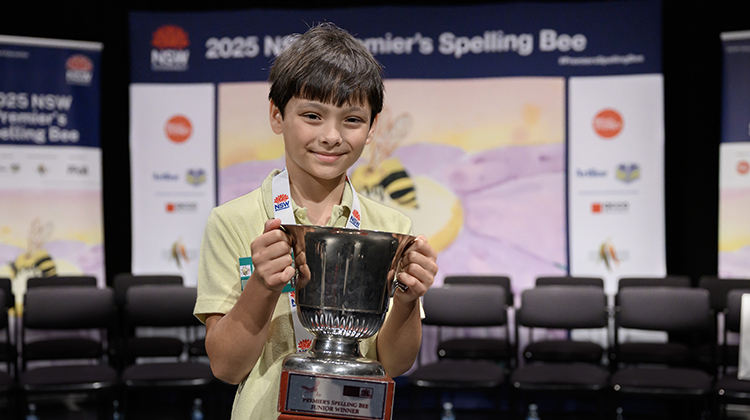NSW Premier's Spelling Bee Winners

Year 4 Narellan Vale Public School student Finn McGhee and Year 6 Eastern Creek Public School student Svastik Biswas have won this year's junior and senior Premier's Spelling Bee rounds.
'Subcutaneous' was the winning word for junior champ Finn, as his runner up, Year 4 Chester Hill Public School student Sukaina Kazmi, misspelled 'sabbatical' during a lengthy spell-off between the two juniors.
After just eight rounds, Svastik took home the senior trophy with the word 'instrumentalist' after his component Mona Vale Public School Year 5 student Blaise Reid struggled with 'Precipitous'.
NSW’s best young spellers came together at Penrith’s Q Theatre today with 64 students competing to be crowned the winner of the 2025 NSW Premier’s Spelling Bee.
The junior and senior finalists from Years 2 to 6 arrived from all corners of NSW to compete with some students travelling to Sydney from Broken Hill, Tregeagle, Tathra and Bega to compete.
This year almost 200,000 students from more than 1,000 NSW public schools participated in this years’ spelling bee, marking a new record for the program.
Half of the finalists are from regional, rural and remote NSW, including all 2025 returning finalists.
Last year’s junior division winner, Wafiq Ayyash from New Lambton Public School, will return to defend his title after winning with the word ‘treachery’.
Year 6 Coonabarabran Public School student William Weatherall made his fourth consecutive appearance at the 2025 state finals.
Hargraves Public School in NSW’s Central West was the only school to be represented in both the junior and senior finals, with junior finalist, Year 2 student Jack Primmer, one of this year’s youngest competitors.
Contestants began with ‘seen’ word lists provided by Macquarie Dictionary before facing ‘unseen’ challenges that test spelling skills and composure under pressure.
Almost 2,000 students competed in 64 regional finals over two weeks to reach the State finals. Among this year’s competitors are 23 finalists who speak a language other than English at home, making up 36 per cent of the competing cohort and representing 16 language groups.